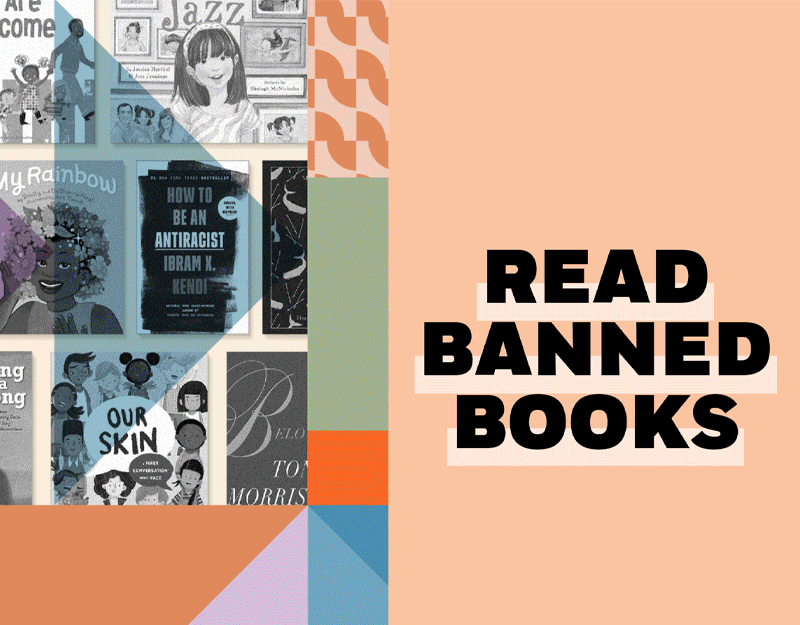SLJ Reviews Penguin Random House Banned Books Database
This digital resource created by Penguin Random House is freely browsable. It provides broad community encouragement and support for resisting book challenges in school and public libraries, as well as links to a host of additional resources and advocacy groups.

URL www.penguinrandomhouse.com/banned-books/
Cost The resource is part of Penguin Random House and is freely browsable, without cost.
Content The landing page is topped by a large banner, with the text “Read Banned Books” on the right side and a colorized collage of book covers on left, including How to Be an Antiracist by Ibram X. Kendi, Beloved by Toni Morrison, The Diary of a Young Girl: Anne Frank, and 1984 by George Orwell. Clicking a down arrow or scrolling opens the page like a stage curtain as text scrolls up from below.
An introductory message notes that, in the 2022–23 school year, “3,362 books were challenged, from those centering racial inequality and LGBTQIA+ themes to classics like The Great Gatsby and Moby Dick,” and affirms the publisher’s opposition to these “attempts at censorship.”
Below the introduction and the heading “What We’re Doing” are three large, colorful cards with links to sections titled Legal Action, Organizations We’re Supporting, How We’re Supporting Authors and Creators, and How We’re Supporting Teachers and Librarians. The cards appear on a ribbon menu across the top of the page. Some of the content appears off to the right of the page and is accessed via intermittently appearing left and right arrows. Horizontal scrolling is awkward, particularly on the smaller screen of a phone.
The Legal Action section describes how Penguin Random House has joined the free expression advocacy group PEN America to support a lawsuit against the Escambia County School District in Florida and several others, all tied to restriction of access to books for children.
The Organizations We’re Supporting section includes links to the American Library Association, National Council of Teachers of English, and PEN America.
The How We’re Supporting Teachers and Librarians page touts the publisher’s promotion of “our titles by LGBTQIA+ and BIPOC creators to teachers and librarians in every state through marketing, events, and conferences.”
A longer navigation ribbon at bottom of the landing page showcases “What You Can Do” resources under the headings Everyone, Authors & Creators, Parents, Students, Teachers & Librarians, and Booksellers.
The Teachers & Librarians section opens with a message from Becky Calzada, District Library Coordinator in Leander, TX and #FReadom Fighters cofounder. Calzada recommends creating or updating library collection development policy and, for those working in a school, forging a partnership with the principal.
Resources are grouped as question prompts, such as “I’m Looking for Resources To Help Advocate for Myself and My Students.” Links are provided to the site for United Against Book Bans, as well as one to set up a Google alert about future bans, and links for submitting a report to the ALA Office of Intellectual Freedom, PEN America, or the National Coalition Against Censorship.
The Students section includes some resources recommended by a student at Baylor University, such as a list of college free speech rankings and the Foundation for Individual Rights and Expression’s Student Press Freedom Initiative.
A link labeled Speak Up at Your School or Library Board Meeting goes to the Random House page on Box.com, which asks for login credentials.
The Everyone resources page opens with an introductory note from Nihar Malaviya, the CEO of Penguin Random House, in which he frames the issue as a “small but vocal group” that has “led the charge in book banning, demanding that books they disagree with be removed from schools and libraries, depriving children of the opportunity to learn from new perspectives and see themselves represented.”
Below the resources cards are several curated lists of books that are “currently under attack in America.” The lists feature titles with themes of race and racism; LGBTQIA+ topics; and themes of violence, sexual experiences, and health or well-being. The works are represented by large book cover cards that scroll left to right. Links are provided to buy the books directly from the publisher.
The site was very difficult to load using cellular data on an iPhone 12, running Chrome version 118, but loaded quickly and was fully functional on broadband Wi-Fi, either on the iPhone or a laptop running Windows 11. Layout and navigation appear the same on both platforms.
Student and teacher resources The Students resources page includes links to the Book Censorship Toolkit, an action plan hosted by the National Coalition Against Censorship, as well as that organization’s Youth Censorship Database, which tracks “book challenges in schools and libraries, as well as censorship of student art, journalism, and other types of student expression in schools.”
Under Teachers & Librarians, linked resources include The Merritt Fund, an ALA endowment for support of librarians threatened with losing their jobs for their support of intellectual freedom, as well as the NCTE Intellectual Freedom Center.
VERDICT Despite some commercial and marketing aspects that materially benefit the publisher, the site provides broad community encouragement and support for resisting book challenges in school and public libraries, as well as links to a host of additional resources and advocacy groups. Given the current political climate around libraries and schools, it’s highly recommended as a starting point for learning about the issues, as well as for encouraging more activist pursuits.
Bob Hassett, Luther Jackson M.S., Falls Church, VA
RELATED
The job outlook in 2030: Librarians will be in demand
The job outlook in 2030: Librarians will be in demand
ALREADY A SUBSCRIBER? LOG IN
We are currently offering this content for free. Sign up now to activate your personal profile, where you can save articles for future viewing






Add Comment :-
Be the first reader to comment.
Comment Policy:
Comment should not be empty !!!